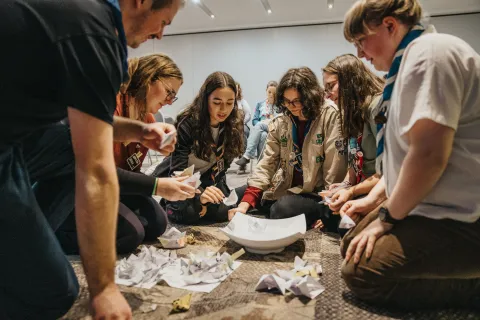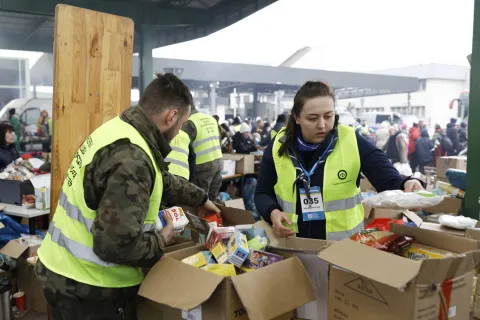How young people are shaping responses to conflict and civic challenges
Across Europe, young people are navigating turbulent times marked by conflict, social fragmentation, and uncertainty. Yet, they are far from passive observers. Through the Voices of Change project, World Scouting and the Erasmus Student Network (ESN) invited youth to reflect on these challenges and share how they are making a difference in their communities. Two focus group discussions, one in person at the European Youth Centre in Budapest (3–7 March 2025) and another online with participants from France and Portugal (24 April 2025), offered powerful insights into how young people view identity, peacebuilding, and civic engagement.

Young people reflect on institutional approaches to conflict and peacebuilding
In Budapest, youth workers from across Europe explored the complex relationship between personal identity and the role of youth organisations in peacebuilding. Many participants expressed a growing disconnect between their personal values and the cautious or neutral positions taken by institutions, especially in times of political crisis or armed conflict.
Activities like visual storytelling and creative modelling opened space for honest dialogue, revealing widespread concerns about increasing political polarisation, limited tools for conflict resolution, and a lack of formal training in peace education. Still, the participants voiced strong belief in the power of grassroots action. They called for youth organisations to show more courage, provide clearer guidance, and help build young people’s capacity to mediate and lead in divided societies.
Youth feel excluded and are driven by purpose
Meanwhile, the online session hosted by ESN International brought together young people living in France and Portugal. They shared how economic hardship, safety concerns, and lack of access to decision-making spaces shape their daily realities. Many spoke of feeling invisible, present in their communities but not truly heard or seen.
Despite these barriers, a deep sense of purpose emerged. Participants said they were driven not by convenience but by values, meaning, and the encouragement of peers. Rather than hand-holding, they asked for structural support: more accessible ways to get involved, opportunities to build relevant skills, and recognition of the contributions made by youth-led initiatives.

Youth want space to reflect, tools to act, and trust to lead
Taken together, the voices from both sessions point to a clear message: young people are ready to lead change, but they need the space, tools, and trust to do so. They want opportunities to critically reflect on the world around them, engage in real dialogue, and take tangible action. What they are asking for is not more talk, but meaningful support to shape the societies they live in.
About the Voices of Change Project
The Voices of Change project, a collaboration between World Scouting and ESN with the support of Erasmus+, is designed to elevate the voices of young people on the frontlines of civic engagement and peacebuilding. The findings from these focus groups will inform the development of a new self-assessment tool, aimed at helping young people better understand their communities, reflect on their potential as changemakers, and identify practical steps they can take locally, nationally, and across Europe to create impact.
By listening to young people and acting on their insights, this project aims to strengthen youth participation where it matters most: in shaping the future.